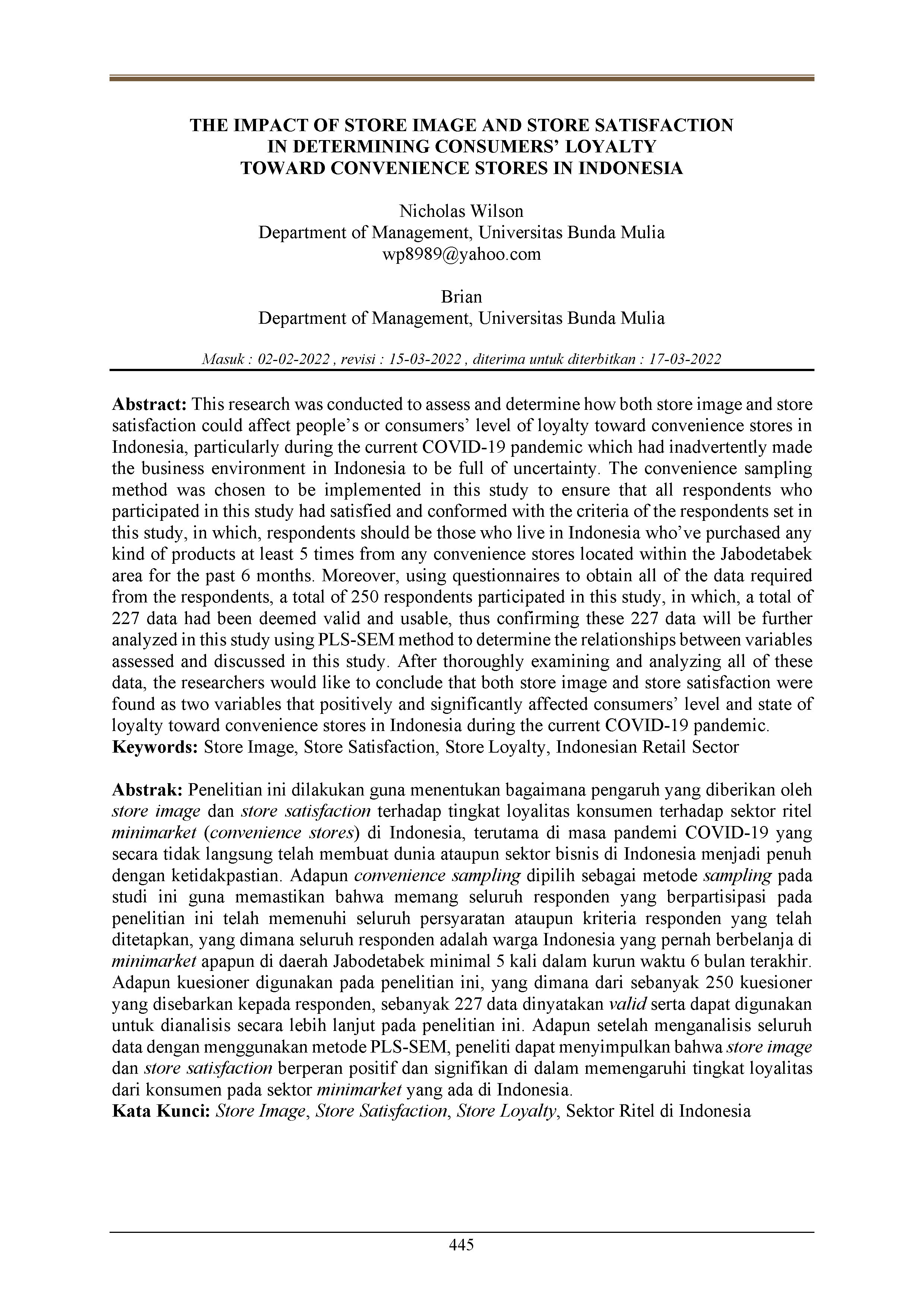The Impact of Store Image and Store Satisfaction in Determining Consumers’ Loyalty toward Convenience Stores in Indonesia
Main Article Content
Abstract
This research was conducted to assess and determine how both store image and store satisfaction could affect people’s or consumers’ level of loyalty toward convenience stores in Indonesia, particularly during the current COVID-19 pandemic which had inadvertently made the business environment in Indonesia to be full of uncertainty. The convenience sampling method was chosen to be implemented in this study to ensure that all respondents who participated in this study had satisfied and conformed with the criteria of the respondents set in this study, in which, respondents should be those who live in Indonesia who’ve purchased any kind of products at least 5 times from any convenience stores located within the Jabodetabek area for the past 6 months. Moreover, using questionnaires to obtain all of the data required from the respondents, a total of 250 respondents participated in this study, in which, a total of 227 data had been deemed valid and usable, thus confirming these 227 data will be further analyzed in this study using PLS-SEM method to determine the relationships between variables assessed and discussed in this study. After thoroughly examining and analyzing all of these data, the researchers would like to conclude that both store image and store satisfaction were found as two variables that positively and significantly affected consumers’ level and state of loyalty toward convenience stores in Indonesia during the current COVID-19 pandemic.
Penelitian ini dilakukan guna menentukan bagaimana pengaruh yang diberikan oleh store image dan store satisfaction terhadap tingkat loyalitas konsumen terhadap sektor ritel minimarket (convenience stores) di Indonesia, terutama di masa pandemi COVID-19 yang secara tidak langsung telah membuat dunia ataupun sektor bisnis di Indonesia menjadi penuh dengan ketidakpastian. Adapun convenience sampling dipilih sebagai metode sampling pada studi ini guna memastikan bahwa memang seluruh responden yang berpartisipasi pada penelitian ini telah memenuhi seluruh persyaratan ataupun kriteria responden yang telah ditetapkan, yang dimana seluruh responden adalah warga Indonesia yang pernah berbelanja di minimarket apapun di daerah Jabodetabek minimal 5 kali dalam kurun waktu 6 bulan terakhir. Adapun kuesioner digunakan pada penelitian ini, yang dimana dari sebanyak 250 kuesioner yang disebarkan kepada responden, sebanyak 227 data dinyatakan valid serta dapat digunakan untuk dianalisis secara lebih lanjut pada penelitian ini. Adapun setelah menganalisis seluruh data dengan menggunakan metode PLS-SEM, peneliti dapat menyimpulkan bahwa store image dan store satisfaction berperan positif dan signifikan di dalam memengaruhi tingkat loyalitas dari konsumen pada sektor minimarket yang ada di Indonesia.
Article Details

This work is licensed under a Creative Commons Attribution-NonCommercial-ShareAlike 4.0 International License.
This work is licensed under a Jurnal Manajemen Bisnis dan Kewirausahaan Creative Commons Attribution-ShareAlike 4.0 International License.
References
Koo, D. M. (2003). Inter-relationships among store images, store satisfaction, and store loyalty among Korea discount retail patrons. Asia Pacific Journal of Marketing and Logistics, 15(4), 42–71. https://doi.org/10.1108/13555850310765033
Nurhayati-Wolff, H. (2021). Retail trade in Indonesia - statistics & facts. Statista. https://www.statista.com/topics/8000/retail-trade-in-indonesia/#dossierKeyfigures
Oxford Business Group. (2021). Smaller vendors a major player in Indonesia’s retail sector. Oxford Business Group. https://oxfordbusinessgroup.com/analysis/your-convenience-smaller-vendors-are-major-player-sector
Soni, P. (2021). Web-store image dimensions and online retail customer loyalty: Investigating mediators and moderators. American Journal of Business, 36(1), 20–34. https://doi.org/10.1108/ajb-08-2020-0133
Wang, C.-Y. (2019). Cross-over effects of corporate reputation and store image: Role of knowledge and involvement. Management Decision, 57(11), 3096–3111. https://doi.org/10.1108/MD-11-2016-0810
Wilson, N., Keni, & Tan, P. H. P. (2019). The effect of website design quality and service quality on repurchase intention in the e-commerce industry: A cross-continental analysis. Gadjah Mada International Journal of Business, 21(2), 187–222. https://doi.org/10.22146/gamaijb.33665
Wilson, N., Keni, & Tan, P. H. P. (2021). The role of perceived usefulness and perceived ease-of-use toward satisfaction and trust which influence computer consumers’ loyalty in China. Gadjah Mada International Journal of Business, 23(3), 262–294. https://doi.org/10.22146/gamaijb.32106


